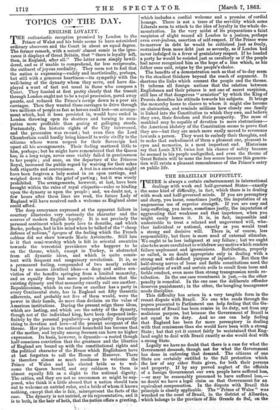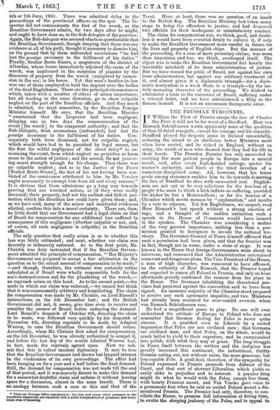THE BRAZILIAN DIFFICULTY. T u. is always a certain embarrassment in
international dealings with weak and half-governed States—exactly the same kind of difficulty, in fact, which there is in dealing with weak and half-governed minds. If you are peremptory and sharp, you incur, sometimes justly, the imputation of an ungenerous use of superior strength. If you are easy and long-suffering, you incur, sometimes justly, the iniputation of aggravating that weakness and that impotence, when you might easily lessen it. It is, in fact, impossible and undesirable to treat a relaxed and ungoverned will, whe- ther individual or national, exactly as you would treat ungenerous use of superior strength. If you are easy and long-suffering, you incur, sometimes justly, the iniputation of aggravating that weakness and that impotence, when you might easily lessen it. It is, in fact, impossible and undesirable to treat a relaxed and ungoverned will, whe- ther individual or national, exactly as you would treat a strong and decisive will. There is, of course, less responsibility, but there is more need of external stimulus. We ought to be less indignant at any failure ; but we ought also to be more carefulnot to withdraw anymotive which renders failure unpleasant and ignominious. Retribution, properly so called, is no doubt appropriate only in dealing with a strong and well-defined purpose of injustice. But then the half-strung nerves of loose and feeble constitutions need the anticipation of swift and certain evils to result from loose and feeble conduct, even more than strong transgression needs re- tribution. In the one case resentment is just,—in the other penalty is remedial. In the one case the deliberate offender deserves punishment; in the other, the bungling transgressor needs discipline. This difficulty has arisen in a very tangible form in the recent dispute with Brazil. No one who reads through the papers presented to Parliament can help feeling that the Go- vernment of Brazil has been remiss in its duty, not from any malicious purpose, but because the Government of Brazil is not equal to its duty. And no one can help feeling that England has been far more peremptory in dealing with that remissness than she would have been with a strong State ; but that yet it cannot fairly be maintained that Eng- land ought to deal with Brazil exactly as she would deal with a strong State. Legally we have no doubt that there is a case for what the Government demands, though not for what the Government has done in enforcing that demand. • The citizens of one State are certainly entitled to the full protection which the law of any other State gives, for both their persons and property. If by any proved neglect of the officials of a foreign Government our own people have suffered loss, --or may be reasonably presumed to have suffered loss,— no doubt we have a legal claim on that Government for an equivalent compensation. In the dispute with Brazil this principle is clearly applicable. The " Prince of Wales " was wrecked on the coast of Brazil, in the district of Albardao, which belongs to the province of Rio Grande do Sul, on the 6th or 7th June, 1861. There was admitted delay in the proceedings of the provincial officers on the spot. The In- spector did not communicate the fact of the wreck, as the Brazilian Government admits, for two days after he might, and ought to have done so, to the Sub-delegate of the province. Again, the Sub-delegate was accused of acts so questionable that the Brazilian Government, though denying that there was any evidence at all of his guilt, thought it necessary to dismiss him, on the ground that by these unfounded accusations " he had lost the prestige necessary to the fulfilment of his duties." Finally, Senhor Bento Soares, a magistrate of the district of Albardao, whose house immediately adjoined the scene of the wreck, was implicated in the suspicion of plunder by the discovery of property from the wreck (uninjured by immer- sion in the sea) in his house. Yet this man's brother-in-law was one of those employed to hold the inquest over the bodies of the dead Englishmen. These are the principal circumstances which, taken with a number of others of minor importance, but all tending in the same direction, go to show culpable neglect on the part of the Brazilian officials. And thus much is admitted, we must remember, by the Brazilian Foreign Minister himself. He says, that the Brazilian Minister " ascertained that the Inspector had been negligent, delaying one or two days the communication of the event [the wreck] to the competent authority; and that the Sub-Delegate, from accusations (unfounded), had lost the prestige necessary to the fulfilment of his duties. Con- sequently both were dismissed, not for culpable neglect, which would have had to be punished by legal means, but the first for wilful negligence of the short delay" in an- nouncing the event, from which neglect no prejudice or harm arose to the action of justice ; and the second, for not possess- ing moral strength enough for his charge. Thus there was no culpable neglect ; and as to the Justice of the Peace [Senhor Bento Soares], the fact of his not having been con- victed of the connivance attributed to him by Mr. Vereker ought necessarily to exempt him from all and every censure." It is obvious that these admissions go a long way towards proving that our wrecked sailors, or (if they were really drowned) their property, had not the earliest and fullest pro- tection which the Brazilian law could have given them ; and, as we have said, many of the minor and incidental evidences elicited, confirm this into a moral certainty. There can, then, be little doubt that our Government had a legal claim on that of Brazil for compensation for any additional loss suffered in consequence of this negligence (whether culpable or not, and, of course, all such negligence is culpable) in the Brazilian officials.
The only question that really arises is as to whether this loss was fairly estimated ; and next, whether our claim was decently or indecently enforced. As to the first point, Mr. Christie was duly instructed that if the Brazilian Govern- ment admitted the principle of compensation, " Her Majesty's Government are prepared to accept a fair arbitration on the question as to the actual amount of compensation to be made," —and though, therefore, the estimate was certainly rather calculated as if Brazil were wholly responsible both for the sea's destructiveness and for the plundering of the wreck,— no reproach arises on this head. As to the second point,—the mode in which our claim was enforced,—we cannot but think that it was unnecessarily arbitrary and humiliating. The claim for compensation was made by Mr. Christie, on Lord Russell's instructions, on the 5th December last ; and the British Government did not, it seems, give time even to receive and consider the answer of Brazil before enforcing the demand. Lord Russell's despatch of October 8th, directing the claim to be made, was followed very quickly by his despatch of November 4th, directing reprisals to be made by Admiral Warren, in case the Brazilian Government should refuse. Accordingly, when Mr. Christie first asked for compensation, on the 5th December, he was already authorized to compel it, and before the last day of the month Admiral Warren had, in fact, made the reprisals agreed upon. Now we sub- mit that this is rather insolent diplomacy. It may be true that the Brazilian Government had shown but languid interest in the vindication of its own proceedings. The affair had been hanging on for a year and a half before the final demand. Still, the demand for compensation was not made till the end of that period, and it was scarcely decent to make this demand for a somewhat doubtful claim and enforce it without leaving space for a discussion, almost in the same breath. There is no analogy between such a case as this and that of the
• Thus our Foreign Office translates it; but this and many other passages in the translated despatches are rendered with a noble independence of grammar, and some- times even of meaning.
Trent. Here, at least, there was no question of an insult to the British flag. The Brazilian Ministry had taken many steps to bring the offenders to justice, and had disgraced two officials for their inadequate or unsatisfactory conduct. The claim for compensation was, we think, good, and doubt- less it would have been essential firmly to enforce it, if only to make the Brazilian Government more careful in future for the lives and property of English ships. But the manner of the proceeding, for a case of mere pecuniary claims, was more than imperious, and has, we think, overleaped itself. The object was to make the Brazilian Government feel keenly the inevitable mischiefs of its loose administration of justice. But we have roused the pride of Brazil, not against her own loose administration, but against our arbitrary treatment of it, and almost given it a diplomatic triumph—for a diplo- matic martyrdom to a weak State is a triumph—by the un- duly menacing character of the proceeding. We wished to administer a tonic to the executive of Brazil, suffering under a relaxed habit, and we have administered a fillip to the disease instead. It is not an uncommon therapeutic error.



























































 Previous page
Previous page